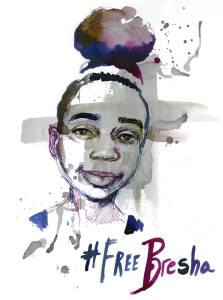Bresha Meadows Case Demonstrates How Domestic Survivors Are Punished for Defending Themselves
Share
Explore Our Galleries
Breaking News!
Today's news and culture by Black and other reporters in the Black and mainstream media.
Ways to Support ABHM?
By Danielle Dorsey
Atlanta Black Star
After nearly a year of being dragged through the criminal justice system, it appears there might finally be some good news in the Bresha Meadows case. The 15-year-old was arrested and charged last year with the murder of her father, but her defense claims she was acting in self-defense after witnessing abuse toward her mother and being subjected to similar abuse for much of her life.

Art for Bresha Meadows by Molly Crabapple
Bresha has been incarcerated in a juvenile detention center for the past nine months, but a preliminary plea deal, offered at her pre-trial hearing on May 8 may allow her to fulfill the the remainder of her 18-month sentence at a mental treatment facility and seal her criminal record as of her 18th birthday.
Bresha’s case has garnered worldwide support and highlighted how our justice system’s treatment of domestic violence victims causes Black women and girls to disproportionately suffer. Through this case and others like it, activists hope to enact systemic change that will allow for more compassionate rulings instead of further criminalizing victims.
Many times, reporting domestic violence can lead to mothers being investigated by child protective services. Until 2014, mothers in Chicago who reported domestic violence could be charged with neglect, and in many places across the country, women who report intimate partner violence face a domino effect of consequences, including eviction from housing under nuisance ordinances. A 2012 study from the American Sociological Association analyzed every nuisance citation in Milwaukee and found that Black households received a disproportionate amount of nuisance complaints and that nearly a third of all citations were generated by domestic violence. A Milwaukee Domestic Violence Experiment study found that arresting abusers isn’t always the solution either, and for African-American victims, arrest increased mortality by 98 percent, compared to a 9 percent mortality increase among white victims.
Read the entire article here
Read more about Bresha Meadows here
Catch up on more Breaking News here









Comments Are Welcome
Note: We moderate submissions in order to create a space for meaningful dialogue, a space where museum visitors – adults and youth –– can exchange informed, thoughtful, and relevant comments that add value to our exhibits.
Racial slurs, personal attacks, obscenity, profanity, and SHOUTING do not meet the above standard. Such comments are posted in the exhibit Hateful Speech. Commercial promotions, impersonations, and incoherent comments likewise fail to meet our goals, so will not be posted. Submissions longer than 120 words will be shortened.
See our full Comments Policy here.